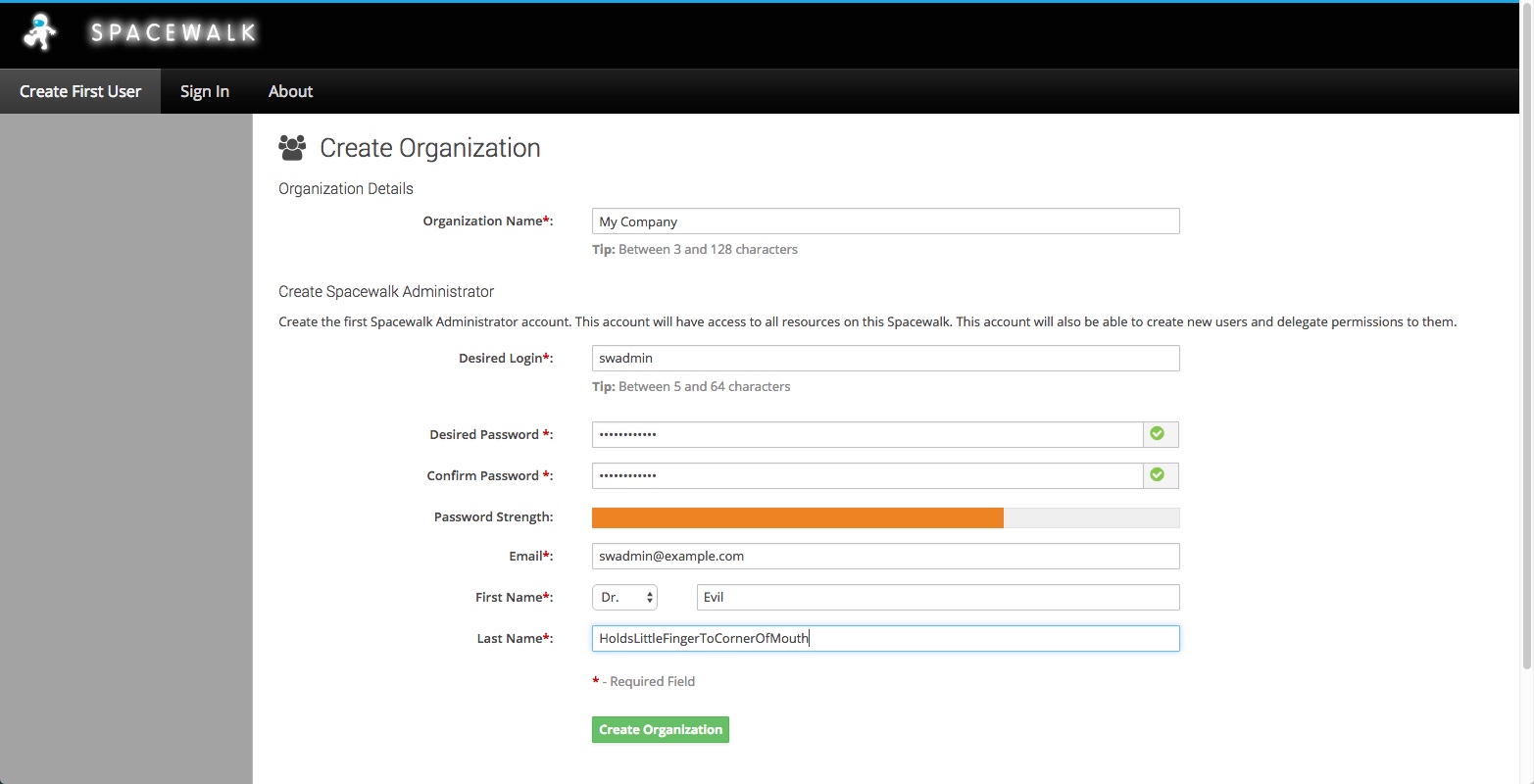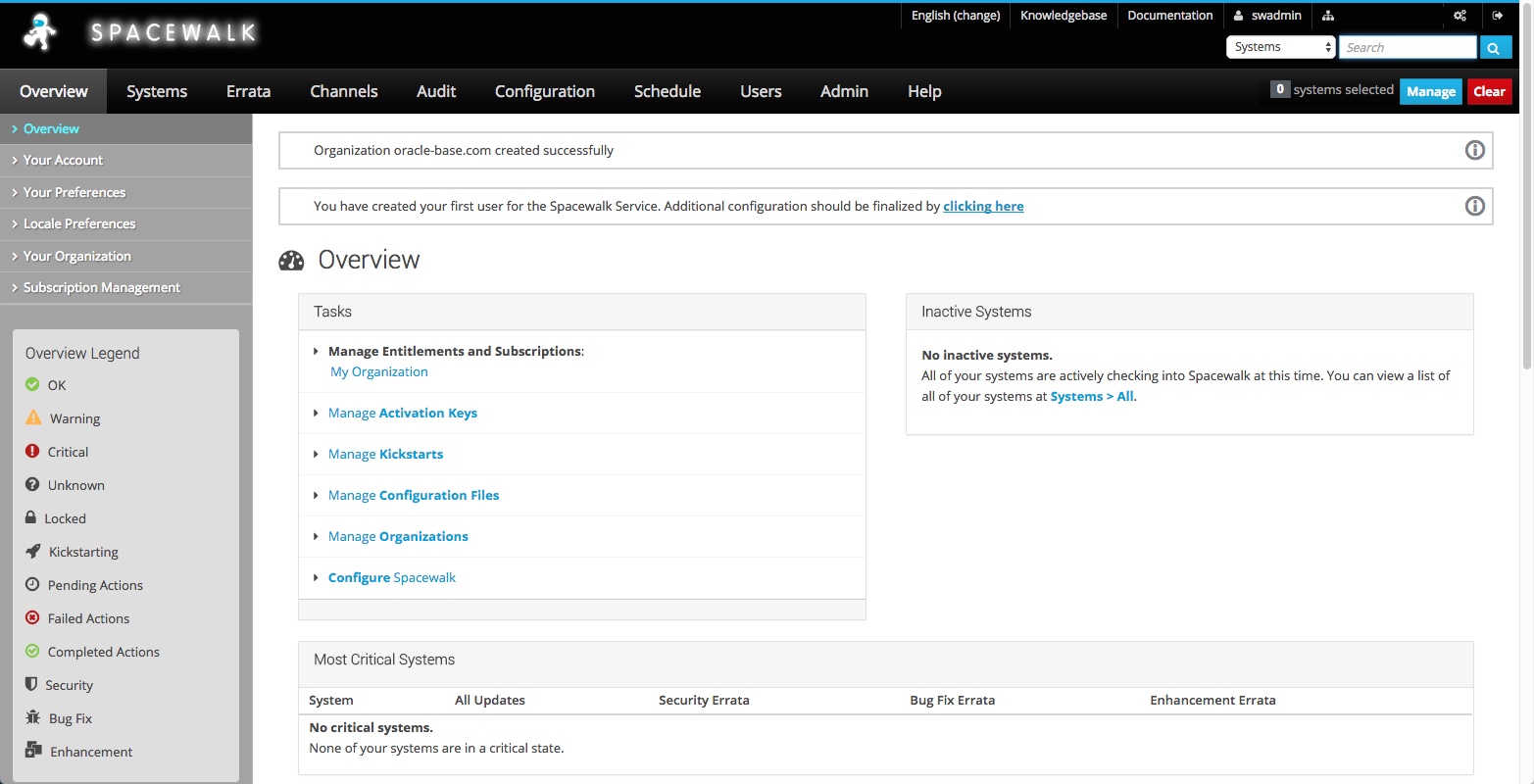Spacewalk is an open source Linux systems management solution. Spacewalk manages software content updates for Red Hat derived distributions such as Fedora, CentOS, and Scientific Linux, within your firewall. You can stage software content through different environments, managing the deployment of updates to systems and allowing you to view at which update level any given system is at across your deployment. A central web interface allows viewing of systems, their associated software update status, and initiating update actions.
Spacewalk also provides provisioning capabilities, allowing you to manage your systems throughout their lifecycle. Via Provisioning, Spacewalk enables you to kickstart provision systems and manage and deploy configuration files. Spacewalk also has virtualization capabilities to enable you to provision, control, manage, and monitor virtual KVM and Xen guests.
Spacewalk is an open community project. Anyone can contribute to the project, including lending a hand with ideas, feedback, contributing a patch, helping draft documentation, sharing your systems management use cases, or even testing.
This article explains how to install Spacewalk on Oracle Linux. You do not need a support contract for Oracle Linux to use this method.
- Server Prerequisites
- Repositories
- Install Spacewalk
- Spacewalk Console
Server Prerequisites
Start with a minimum installation of Oracle Linux 6 or 7. You can add the desktop packages if you want, but they are not necessary. Once the OS installation is complete, perform the following tasks as the "root" user.Make sure the Spacewalk server has a fully qualified domain name, with an entry in the "/etc/hosts" file.
192.168.0.10 ol7-sw.localdomain ol7-sw
Make the necessary firewall changes.
# OL7
firewall-cmd --add-service=https --permanent
firewall-cmd --add-service=http --permanent
firewall-cmd --reload
# OL6
iptables -A INPUT -p tcp --dport 80 -j ACCEPT
iptables -A INPUT -p tcp --dport 443 -j ACCEPT
service iptables save
Repositories
You will need to install a few repositories before you get started.Enable the Oracle Linux optional packages repository. For example, on Oracle Linux 7 set "enabled=1" in the following entry of the "/etc/yum.repos.d/public-yum-ol7.repo" file.
[ol7_optional_latest]
name=Oracle Linux $releasever Optional Latest ($basearch)
baseurl=http://yum.oracle.com/repo/OracleLinux/OL7/optional/latest/$basearch/
gpgkey=file:///etc/pki/rpm-gpg/RPM-GPG-KEY-oracle
gpgcheck=1
enabled=1
Install the EPEL repository for your version.
# OL7
rpm -Uvh https://dl.fedoraproject.org/pub/epel/epel-release-latest-7.noarch.rpm
# OL6
rpm -Uvh https://dl.fedoraproject.org/pub/epel/epel-release-latest-6.noarch.rpm
Add the JPackage repository.
cat > /etc/yum.repos.d/jpackage-generic.repo << EOF
[jpackage-generic]
name=JPackage generic
#baseurl=http://mirrors.dotsrc.org/pub/jpackage/5.0/generic/free/
mirrorlist=http://www.jpackage.org/mirrorlist.php?dist=generic&type=free&release=5.0
subscription-manager repos –enable=rhel-7-server-optional-rpms
enabled=1
gpgcheck=1
gpgkey=http://www.jpackage.org/jpackage.asc
EOF
Add the Spacewalk repository for your version.
# OL7
rpm -Uvh http://yum.spacewalkproject.org/2.5/RHEL/7/x86_64/spacewalk-repo-2.5-3.el7.noarch.rpm
# OL6
rpm -Uvh http://yum.spacewalkproject.org/2.5/RHEL/6/x86_64/spacewalk-repo-2.5-3.el6.noarch.rpm
Install Spacewalk
To keep things simple, we'll do a default installation using postgreSQL as the Spacewalk database.# Configure the Spacewalk database.
yum install spacewalk-setup-postgresql -y
# Install Spacewalk
yum install spacewalk-postgresql -y
Create an answer file for the configuration of Spacewalk, adjusting the values as required.
cat > /tmp/answer-file.txt <
Configure Spacewalk using the answer file created previously.spacewalk-setup --answer-file=/tmp/answer-file.txtYou can restart the Spacewalk service using the following commands./usr/sbin/spacewalk-service stopYou can now access the Spacewalk console using the following URL on the server.
/usr/sbin/spacewalk-service start
/usr/sbin/spacewalk-service restarthttps://localhostIf you want the console to be accessible externally, amend the "/etc/tomcat/server.xml" file as follows.# From
Spacewalk Console
The first time you go to the Spacewalk URL you will be prompted to create a new organization with administrator login credentials. Enter the required information and click the "Create Organization" button.You are now able to start using Spacewalk.
 You are now able to start using Spacewalk.
You are now able to start using Spacewalk. 